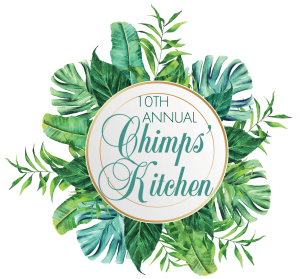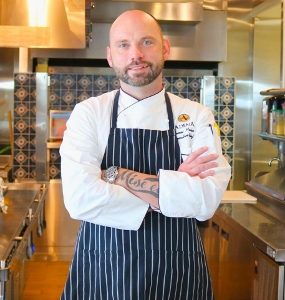
Join us for our 10th Annual Chimps’ Kitchen – a chef tasting event to benefit Save the Chimps!
Thursday, November 1, 2018 from 6pm to 9pm
Chimps’ Kitchen features esteemed chefs from along the Treasure Coast. We look forward to sharing their culinary creations with you at the event on November 1st, 2018, at the beautiful Cobalt Restaurant in the Vero Beach Hotel and Spa. Guests will enjoy delicious signature small plates created and donated by local chefs, wine, beer, themed cocktails, a wonderful selection of raffle and silent auction items, and worldly beats by DUO VIDA, all with a spectacular ocean view. Proceeds benefit the nearly 250 chimpanzees in our care.
 Among the talented chefs featured at the event is Executive Chef James Mason of Grand Harbor. Learn more about him with the interview below and join us at Chimps’ Kitchen to enjoy his culinary creations!
Among the talented chefs featured at the event is Executive Chef James Mason of Grand Harbor. Learn more about him with the interview below and join us at Chimps’ Kitchen to enjoy his culinary creations!
Q. How long have you been a chef and what inspired you to become one?
A. I tried a lot of things in my teenage years and early 20’s academically and professionally but when it came down to deciding what I really loved doing it was the kitchen, no question about it. I’m coming up on 22 years of hospitality experience and couldn’t be happier with how it turned out.
Q. Is this your first time as a Chimps’ Kitchen Chef?
A. It is, I’m honored to be able to participate and I look forward to meeting some locals, I’m barely a year settled in Vero Beach and still getting to know the place honestly.
Q. Chimpanzees make and use tools, such as stones to crack nuts, twigs to probe for insects or honey, spears to hunt small mammals, and wads of crumbled leaves to sponge drinking water from hard-to-reach places. As a chef, what are your favorite tools to use and why?
A. Whatever gets the job done, I have worked in places where we were able to afford specialty tools for jobs like shelling nuts and cleaning seafood. But I have also worked where we had to improvise to get the job done, one of my favorite tricks I learned in Crystal River from scalloping. Find some way to sharpen the round tip of a simple dinner spoon and boom you got a clam knife for the evening to help clean your scallop haul.
Q. Chimpanzees are omnivores. They rely heavily on a wide variety of fruit and leaves, but also eat insects, bark, eggs, and nuts. The nearly 250 chimpanzee residents at Save the Chimps are served three balanced meals per day and collectively eat 1,150 bananas a day! This begs the question, what might you be serving at Chimps’ Kitchen?
A. I love grains and vegetables, oils and vinegars and by doing so I try to make them the center of the plate. I loved that there was encouragement for a vegetarian option, so I had to jump on the opportunity. I guess you will just have to attend the event and see!
Q. Chimpanzees in the wild have different cultures. That is, different groups of chimpanzees that live in different parts of Africa have unique behaviors, tools, and traditions that are passed down from generation to generation. What would you say is your favorite culinary culture and which food from that culture do you like cooking most?
A. I like low country cooking, the type of food that regardless of culture utilizes techniques like braising, canning, pickling and preserving. This typically happens near marsh and lower altitude areas near the coast if possible and it allows for a lot of very simple and natural flavors to be enjoyed year-round.
Q. Chimpanzees communicate with each other through a complex system of vocalizations, gestures, body postures, and facial expressions. They often use loud calls called pant-hoots to communicate with each other. Do chefs ever communicate with each other in a similar fashion when things heat up in the kitchen?
A. Much like the answer on tool improvisation language goes the same for me, verbal communication, nonverbal gestures and emphasis on emotion and urgency are all things we use on a regular basis during the busy times in a kitchen. We as culinarians set high standards for ourselves and food but it’s totally acceptable to use any communication methods on hand or improvised to get the job done. It creates a pretty special bond really with those we work with most that it’s hard to convey to others who aren’t there.

